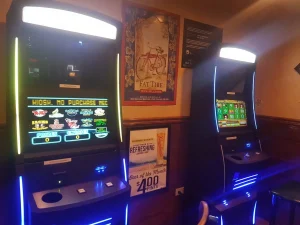 The Texas Supreme Court has denied a petition for review in a case involving a gaming company’s contract with a local VFW post to offer a “sweepstakes game” in return for a percentage of the proceeds.
The Texas Supreme Court has denied a petition for review in a case involving a gaming company’s contract with a local VFW post to offer a “sweepstakes game” in return for a percentage of the proceeds.
Sidetracked Bar, LLC v. Glen Hegar, Comptroller of Public Accounts of the State of Texas; and Ken Paxton, Attorney General for the State of Texas (No. 03-21-00335-CV; filed December 29, 2022; pet. denied June 9, 2023) arose from a sales tax audit conducted by the comptroller that resulted in the assessment of tax, penalties, and interest of almost $400,000. The subject of the audit, Sidetracked, operates, among other things, “sweepstakes” games under contract with charitable organizations such as VFW posts. Here Sidetracked contracted with Post 95 for a 10% share of the gross proceeds of a gaming facility located on premises leased by Sidetracked, using equipment owned or leased by Sidetracked, and operated by Sidetracked personnel. The sweepstakes game worked essentially like a coin-operated slot machine, where patrons received upon entry to the facility a magnetic card containing a certain number of free entries. They could then do one of two things: use an “instant validation terminal” to determine if their card had any winners or play a simulated slot-machine game on an “entertainment validations terminal” to reveal any winners. Once they exhausted the free card, they could obtain additional entries by making a “donation” to the VFW hall. Sidetracked collected the proceeds of the “donations” and deposited them in Post 95’s bank account, which paid out 40% to Sidetracked IT vendors and 50% to Sidetracked, retaining only the Post’s 10% share. Post 95 had nothing else to do with the operation other than open the bank account.
When Sidetracked didn’t pay any sales taxes for several years, the comptroller got curious and audited the company’s contract with the Post (and probably others as well). The audit determined that Sidetracked provided an nonexempt, taxable “amusement service” and owed tax, penalties, and fees, which the comptroller duly assessed. Sidetracked paid the taxes under protest and filed a suit for a refund. A Travis County trial court granted summary judgment in favor of the comptroller and denied Sidetracked’s competing motion for summary judgment. Sidetracked appealed.
In an opinion by Justice Baker, the court of appeals affirmed. The first issue was whether the sweepstakes game constituted an “amusement service” under § 151.0028(a), Tax Code. Comptroller rules define this term to mean “[e]ntertainment, recreation, sport, pastime, diversion, or enjoyment that is a pleasurable occupation of the senses.” 34 TAC § 3.98(a)(1). The court had no trouble concluding that “patrons’ swiping of their magnetic cards (loaded with entries) at the validation terminals and playing of the slot-machine games to discover whether any of their entries were winners constituted amusement” (citation omitted). The evidence further showed conclusively that Sidetracked, not Post 95, owned and ran the whole operation.
Having determined that Sidetracked provided an amusement service, the next inquiry was whether it made taxable “sales.” The comptroller argued that when a patron made a “donation” to refill their magnetic card, the patron actually paid an admission fee as “consideration for its provision of amusement services” under § 151.005(3). Collection of admission fees is one of the four statutory activities that constitute a “sale” (the others are transfer of title to or possession of a ticket, collection of dues or a charge for membership or special privilege at a club or organization, or the use of a coin-operated machine). Construing “admission fee” according to its common meaning, the court determined that the “objective reality of the transactions at issue” indicated that the “donations” constituted admissions payments in exchange for sweepstakes entries in which patrons could play the game and win cash prizes.
Sidetracked then tried to convince the court that it was entitled to an exemption because the amusement services were “exclusively provided…by a nonprofit corporation or association” pursuant to § 151.3101(a)(3). It further claimed an exemption based on a since-repealed section of the Tax Code that exempted “coin-operated machines.” The court held that Sidetracked did not produce the conclusive summary judgment evidence clearly establishing each element of the exemption. First, there was no question that Sidetracked provided the service, not Post 95, as the court had previously determined. Second, Sidetracked failed to show that its validation terminals were anything other than “coin-operated machines” as defined by § 2153.002(a), Occupations Code (“any kind of machine or device operated by or with a coin or other United States currency, metal slug, token, electronic card, or check . . .”). Unfortunately for Sidetracked, the audit also revealed that it had not registered the validation terminals as coin-operated machines, failed to obtain required licenses to operate them, and paid no occupation taxes. Sidetracked claimed an innocent good faith belief that they weren’t subject to the statute and their machines, “illegally owned and operated,” were in fact exempt. The court didn’t much like this, parenthetically commenting that “no one shall be permitted to found any claim upon his own inequity or take advantage of his own wrong.” Be careful what you ask for.
The court ended the show by rejecting Sidetracked’s claim for a refund for only the portion of taxes assessed on its payment of the 10% share to Post 95. Observing that the summary judgment evidence showed that Sidetracked received payment of all the proceeds, the court could find no “Tax Code provision exempting from the assessment of sales taxes any proceeds received from taxable sales but thereafter paid to other entities, including charities.” In other words, what Sidetracked did with its own money is none of the state’s concern, just whether it paid the taxes it owed.











